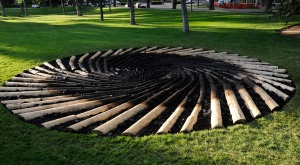Carbon Sink (sculpture): Difference between revisions
No edit summary |
No edit summary |
||
| Line 1: | Line 1: | ||
{{Display censorship incident | {{Display censorship incident | ||
|ongoing= | |ongoing=no | ||
|year=2012, | |year=2012, | ||
|region=North America | |region=North America | ||
| Line 8: | Line 8: | ||
|medium=Public Art, Sculpture | |medium=Public Art, Sculpture | ||
|date_of_action=May 22, 2011 | |date_of_action=May 22, 2011 | ||
|location=University of Wyoming | |location=University of Wyoming | ||
|description_of_content=The sculpture is a 36-foot-wide flat whirlpool twist of coal and charred Wyoming, beetle-killed, lumber, spiraling into the ground. | |description_of_content=The sculpture is a 36-foot-wide flat whirlpool twist of coal and charred Wyoming, beetle-killed, lumber, spiraling into the ground. | ||
|description_of_incident=Tom Buchanan, president of the University of Wyoming, privately ordered that the sculpture, “Carbon Sink,” be dismantled a year ahead of schedule, due to the uproar surrounding the artwork. “Carbon Sink” appeared on the university campus. | |description_of_incident=Tom Buchanan, president of the University of Wyoming, privately ordered that the sculpture, “Carbon Sink,” be dismantled a year ahead of schedule, due to the uproar surrounding the artwork. “Carbon Sink” appeared on the university campus. | ||
| Line 24: | Line 22: | ||
Defending the artwork was Jeff Lockwood, a professor of natural sciences and humanities. Dr. Lockwood was outspoken about his frustration over the university’s handling of “Carbon Sink.” He said that outrage had grown among students and faculty members. | Defending the artwork was Jeff Lockwood, a professor of natural sciences and humanities. Dr. Lockwood was outspoken about his frustration over the university’s handling of “Carbon Sink.” He said that outrage had grown among students and faculty members. | ||
“I’m disappointed that the university caved in to that sort of extortion and that sort of implied threat,” Dr. Lockwood said. “And I’m angry that this sort of behavior on the part of private industry, as well as their effectiveness in lobbying our elected officials, would lead to an act of artistic censorship on a university campus.” | “I’m disappointed that the university caved in to that sort of extortion and that sort of implied threat,” Dr. Lockwood said. “And I’m angry that this sort of behavior on the part of private industry, as well as their effectiveness in lobbying our elected officials, would lead to an act of artistic censorship on a university campus.” | ||
|description_of_result="Carbon Sink" was dismantled. Workers of the University of Wyoming removed the wood and coal, and filled the circle of earth with sod. Most of the wood was sent to the landfill, and the coal was burned for heat in the university's central energy plant. | |description_of_result="Carbon Sink" was dismantled. Workers of the University of Wyoming removed the wood and coal, and filled the circle of earth with sod. Most of the wood was sent to the landfill, and the coal was burned for heat in the university's central energy plant. | ||
|image=COAL-articleLarge.jpg | |image=COAL-articleLarge.jpg | ||
}} | }} | ||
Latest revision as of 15:25, 14 November 2016
Artist: Chris Drury
Year: 2012
Date of Action: May 22, 2011
Region: North America
Location: University of Wyoming
Subject: Political/Economic/Social Opinion
Medium: Public Art, Sculpture
Confronting Bodies: University of Wyoming administration
Description of Artwork: The sculpture is a 36-foot-wide flat whirlpool twist of coal and charred Wyoming, beetle-killed, lumber, spiraling into the ground.
The Incident: Tom Buchanan, president of the University of Wyoming, privately ordered that the sculpture, “Carbon Sink,” be dismantled a year ahead of schedule, due to the uproar surrounding the artwork. “Carbon Sink” appeared on the university campus.
Dr. Buchanan wrote a note to the University of Wyoming’s museum art director, stating, it would be best to remove “Carbon Sink,” “given the controversy that it has generated.”
“Carbon Sink” is a sculpture that is a 36-foot-wide, flat whirlpool twist of coal, and charred Wyoming, beetle-killed, lumber, spiraling into the ground. The University of Wyoming Public Art Committee commissioned British artist, Chris Drury, to create the sculpture. The artwork cost approximately $45,000, paid for by an anonymous donor and the Wyoming Cultural Trust.
Drury’s project description didn’t mention climate change or the coal industry. Yet, the idea behind the sculpture was simple and provocative: a swirl of dead wood and lumps of coal, intended to show the link between global warming and the pine beetle infestation that has ravaged forests across the Rockies.
However, Wyoming is a place where the oil, gas and mining industries are the soul of the economy. Thus “Carbon Sink’s” symbolism caused a lot of anger. Local lawmakers and officials in Wyoming’s energy industry raised objections. For instance, State Representative Thomas E. Lubnau II threatened to introduce legislation that would ensure that “no fossil-fuel-derived tax dollars find their way in the University of Wyoming funding stream.”
Defending the artwork was Jeff Lockwood, a professor of natural sciences and humanities. Dr. Lockwood was outspoken about his frustration over the university’s handling of “Carbon Sink.” He said that outrage had grown among students and faculty members.
“I’m disappointed that the university caved in to that sort of extortion and that sort of implied threat,” Dr. Lockwood said. “And I’m angry that this sort of behavior on the part of private industry, as well as their effectiveness in lobbying our elected officials, would lead to an act of artistic censorship on a university campus.”
Results of Incident: "Carbon Sink" was dismantled. Workers of the University of Wyoming removed the wood and coal, and filled the circle of earth with sod. Most of the wood was sent to the landfill, and the coal was burned for heat in the university's central energy plant.
Source:
